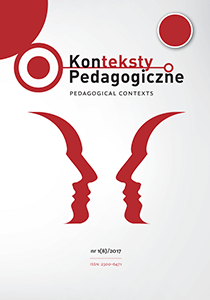Abstract
The article presents the results of the research regarding the syntactic and semantic difficulty in Czech history textbooks for the first level of primary school. We examined a total of 13 textbooks from 7 publishers. The Nestler-Průcha-Pluskal method was used for analysis. The results show that the overall difficulty of text ranges between 19–27 points, which can be evaluated as adequate text difficulty for the given year. Syntactic difficulty oscillates between 7–12 points and the average length of a sentence is around 12 words. The semantic difficulty of text is somewhat higher (between 10–16 points) compared to the syntactic (around 9 points). We identified greater differences in the semantic difficulty of text. The statistically significant differences are among the individual themed units. Topics related to modern history (19th and 20th century) appear to be more diffi-cult. The density coefficient of expert information in the total number of concepts ranges around 27%, which is seen as relatively low difficulty in comparison to other research. It is however adequate to the given (4th and 5th) grade.
References
Beneš, P., Janoušek, R., Novotný, M. (2009). Hodnocení obtížnosti textu středoškol-ských učebnic. Pedagogika, 3. Červenková, I. (2011). Užívání učebnic v činnostech žáků na 2. stupni ZŠ. Olomouc: Palacky University.
Dvořák, D. (2005). Učebnice: nepřátelé, nebo spojenci? Učitelské noviny, 41.
Greger, D. (2004). Učebnice jako realizační scénář kurikula.In: E. Walterová et al. (eds.), Úloha školy v rozvoji vzdělanosti.Brno: Paido.
Greger, D. (2005). Proces schvalování učebnic v historicko-srovnávací perspektivě. Pedagogická orientace, 3.
Hrabí, L. (2005). Učebnice přírodopisu a jejich obtížnost. Pedagogická orientace, 3.
Jakubcová, P. (2012). Analýza didaktické vybavenosti učebnic občanské výchovy pro 6. a 7. ročník základní školy. Diplomová práce. Brno.
Maňák, J. (2007). Učebnice jako kurikulární projekt. In: J. Maňák, P. Knecht (eds.), Hodnocení učebnic. Brno: Paido.
Maňák, J. (2008). Funkce učebnice v moderní škole. In: P. Knecht et al. (eds.), Učebnice z pohledu pedagogického výzkumu. Brno: Paido.
Mikk, J. (2007). Učebnice: budoucnost národa. In: J. Maňák, P. Knecht (eds.), Hodnocení učebnic. Brno: Paido.
Nestler, K. (1974). Zur Wirkung lexikalischer und syntaktisher Textmerkmale auf das Lernergebnis. Informationen zu Schulbuchfragen, 17.
Pluskal, M. (1996). Zdokonalení metody pro měření obtížnosti didaktických textů.Pedagogika, 1.
Průcha, J.(1989). Teorie, tvorba a hodnocení učebnic. Praha: ÚÚVPP.
Průcha, J. (1997). Moderní pedagogika. Praha: Portál.
Průcha, J. (1998). Učebnice: teorie a analýzy edukačního média: příručka pro studenty, učitele, autory učebnic a výzkumné pracovníky.Brno: Paido.
Průcha, J. (2006). Učebnice: teorie, výzkum a potřeby praxe. In: J. Maňák, D. Klapko (eds.), Učebnice pod lupou. Brno: Paido.
Průcha, J. (2008). Možnosti výzkumu učebnice ve vztahu k učení. In: P. Knecht et al. (eds.), Učebnice z pohledu pedagogického výzkumu. Brno: Paido.
Sikorová, Z. (2007). Návrh seznamu hodnotících kritérií pro učebnice základních a středních škol. In: J. Maňák, P. Knecht (eds.), Hodnocení učebnic. Brno: Paido.
Šimik, O. (2014). Učebnice přírodovědy pohledem pedagogického výzkumu. Ostrava: Ostravská univerzita. Smutková, T. (2012). Srovnání učebnic přírodopisu v České a Slovenské republice.Diplo-mová práce. Brno.
In accordance with the recommendation of the Ministry of Science and Higher Education, which aims to counteract the practice of “ghostwriting” and “guest authorship,” all authors submitting their text for publication should attach an author’s statement which declares the contribution of each of the authors to the article. The printed and signed statement should be delivered by mail or other means to editor-in-chief Joanna Skibska or sent in the form of a scan to the following e-mail address: redakcja@kontekstypedagogczne.pl. The authors will not receive remuneration for publishing their papers. The editors reserve the right to make minor editorial changes to the articles which will not affect the substance of the article. We encourage all authors to prepare their articles in accordance with the guidelines for manuscript preparation. Download pdf file.
Authors transfer all copyrights and grant the journal the right of first publication with the work simultaneously licensed under a Creative Commons Attribution License that allows others to share the work with acknowledgement of the work's authorship and initial publication in this journal. All authors agree to the publishing of their email addresses, affiliations and short bio statements with their articles during the submission process.

